
After Modi, Who? A Comprehensive Look at BJP's Potential Successors?!
Modi's leadership has left a lasting impact, so the BJP faces the challenge of choosing a successor who can carry forward his legacy and address new challenges. This article delves into the top contenders for the post, providing detailed information on their backgrounds, accomplishments, and public perception.
NEWS/CURRENT AFFAIRSTHE GREAT LEADERBJP
Sachin K Chaurasiya
8/23/20247 min read
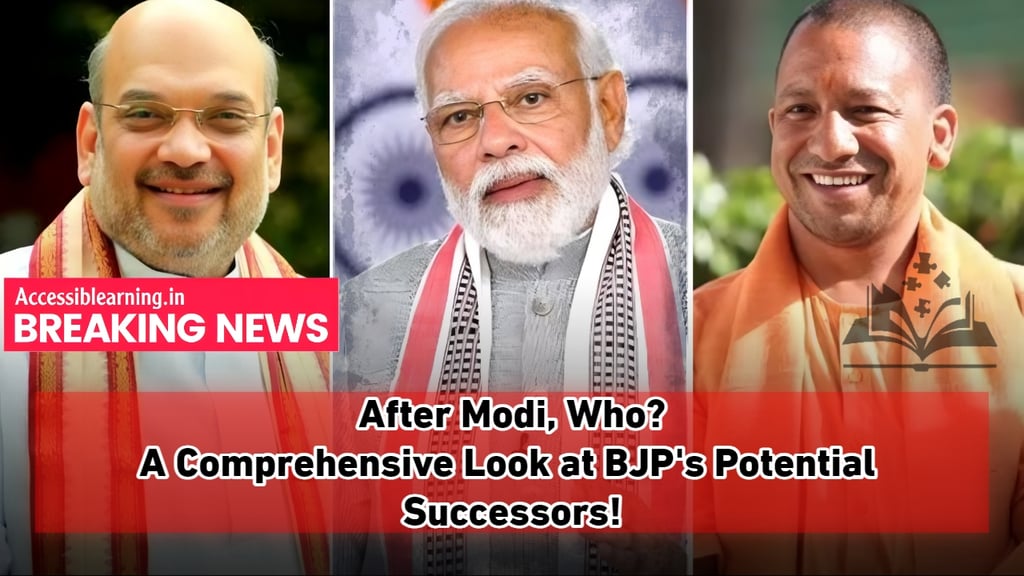

As Prime Minister Narendra Modi's tenure continues to shape Indian politics, the question of who could be his successor in the Bharatiya Janata Party (BJP) remains a key topic. Modi's leadership has left a lasting impact, so the BJP faces the challenge of choosing a successor who can carry forward his legacy and take on new challenges. This article elaborates on the top contenders for the post, providing detailed information on their backgrounds, accomplishments, and public perception.
Additional Insights on BJP’s Potential Successors
To provide a deeper understanding of the potential successors to Narendra Modi Ji (नरेन्द्र मोदी जी) within the Bharatiya Janata Party (BJP), it’s important to explore several additional aspects:
Political and Economic Context
Economic landscape: The post-Modi Ji's economic environment will play a key role in determining the successor. With challenges such as post-COVID-19 economic recovery, inflation, and unemployment, the new leader will need to address these issues effectively. The candidate's track record in economic management will be a key factor.
Political stability: India's political landscape is dynamic, with regional parties gaining prominence and issues such as national security, communal harmony, and federalism coming to the fore. The successor's ability to address these concerns while maintaining political stability will be essential.
Public Sentiment and Media Perception
Public Opinion: Public surveys and opinion polls reflect the electorate’s preferences and concerns. Understanding these sentiments provides insight into how different candidates are viewed by the general populace. This includes analyzing their approval ratings, perceived effectiveness, and ability to connect with various demographic groups.
Media Coverage: The media portrayal of potential successors influences public perception. Analyzing how candidates are covered in the media, including their strengths and controversies, offers a glimpse into their public image and the narratives shaping their political prospects.
Party Dynamics and Internal Factors
Factionalism within the BJP: Like any major political party, the BJP too has internal factionalism and power centres. The selection of Modi Ji's successor will involve balancing these factions to ensure party unity. Understanding the internal power dynamics and the role of influential party leaders can shed light on the succession process.
Role of the RSS (Rashtriya Swayamsevak Sangh): The RSS, the ideological mentor of the BJP, plays a key role in shaping the party's decisions. The influence of the RSS on the selection of a successor, including their preferences and expectations, will be a key factor.
Regional and National Implications
Regional influence: Different regions of India have different political priorities and challenges. The successor's ability to address regional concerns and maintain a balanced approach will be crucial for national stability. For example, candidates with strong regional connections or leadership experience in key states may be preferred.
Impact on national policies: The successor's stance on key national issues, including economic reform, foreign policy, and social justice, will influence their acceptance and effectiveness. Analyzing their policy positions and proposed agenda can provide insights into how they may shape India's future.
International Perspective
Global Relations: India's role on the global stage and its relations with other countries will be affected by the new leader's foreign policy approach. Understanding how each candidate's international experience and views align with India's strategic interests provides a comprehensive view of their potential influence.
Economic and Trade Relations: The successor's approach to international trade agreements, investment policies, and economic partnerships will affect India's economic trajectory. Analyzing their past performance in these areas can provide insight into their future strategies.
Leadership Style and Governance Approach
Leadership style: Each potential successor brings a unique leadership style, from the strategic acumen of Shah to the firm governance of Adityanath, the pragmatic administration of Gadkari, and the steady statesmanship of Singh. Understanding these styles helps to gauge how they might tackle challenges and lead the country.
Governance approach: The successor's approach to governance, including their focus on development, security, and social issues, will shape their effectiveness. An analysis of their past governance experience and policy implementation provides information about their likely approach.
Electoral Strategy and Future Prospects
Electoral strategy: The new leader's ability to connect with voters and build effective electoral strategies will be crucial to sustaining the BJP's electoral success. Evaluating his past electoral strategies and campaign management skills provides insight into his likely approach.
Future prospects: The successor's long-term impact on the BJP's prospects and India's political landscape will depend on his ability to innovate, address emerging challenges, and retain public support. Assessing his approach and strategic plans for the future provides a glimpse into his likely trajectory.
Amit Shah: The Strategic Architect
Amit Shah (अमित शाह), the current Home Minister of India, is one of the most influential figures in Indian politics. Born on October 22, 1964, Shah has been a key player in the BJP’s rise to power. He first entered the political arena as a member of the Gujarat Legislative Assembly in 1997, and his political career has since been marked by a series of significant roles:
General Secretary of the BJP (2001–2007): Shah played a crucial role in strengthening the party’s organizational structure. His efforts in Gujarat were instrumental in securing electoral victories for the BJP.
President of the BJP (2014–2020): As party president, Shah masterminded the BJP’s strategy that led to a historic victory in the 2014 and 2019 general elections. His role in consolidating the party’s position and expanding its base was pivotal.
Home Minister (2019-Present): In his current role, Shah has overseen several critical initiatives, including the abrogation of Article 370 in Jammu and Kashmir and the implementation of the Citizenship Amendment Act (CAA). His tenure has been marked by a focus on national security and internal stability.
Public Perception
Shah is known for his political acumen and organizational skills. His tough stance on issues such as national security and immigration may have polarized public opinion, but he remains a respected leader within the BJP. His strategic vision and deep involvement in party affairs make him a prime candidate for succession.
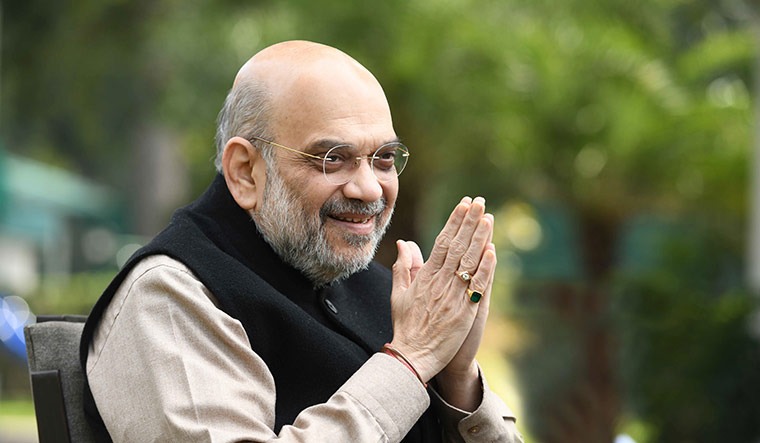

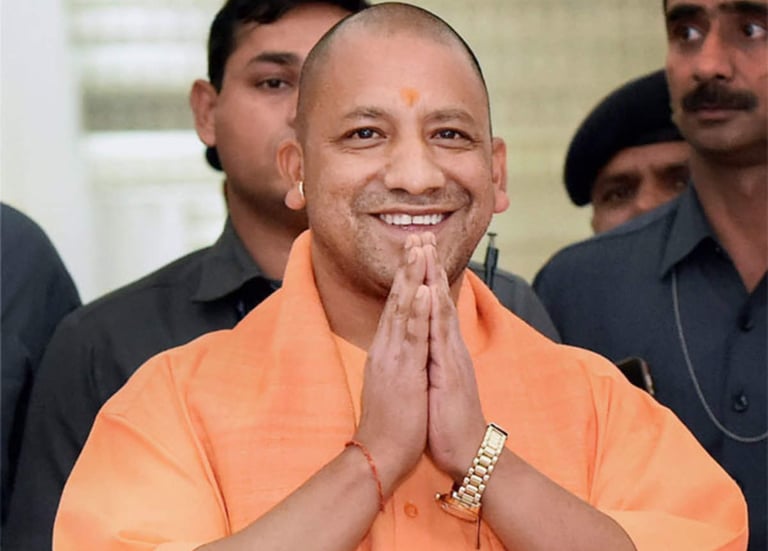

Yogi Adityanath: The Assertive Leader
Yogi Adityanath (योगी आदित्यनाथ), born Ajay Mohan Bisht on June 5, 1972, has been the Chief Minister of Uttar Pradesh since 2017. His leadership style is characterized by a blend of development-focused policies and strong Hindutva ideology. His career highlights include:
Member of Parliament (1998–2017): Representing the Gorakhpur constituency, Adityanath gained prominence for his outspoken views and commitment to his constituents.
Chief Minister of Uttar Pradesh (2017–Present): His tenure as Chief Minister has been marked by aggressive development projects, including infrastructure improvements and initiatives aimed at boosting economic growth. He has also taken a tough stance on law and order, which has both garnered support and faced criticism.
Public Perception
Yogi Adityanath is seen as a dynamic leader who embodies the BJP's Hindutva ideology. His firm governing style and focus on development projects have earned him a loyal support base among the party's core base. However, his polarising views may limit his appeal to more moderate voters.
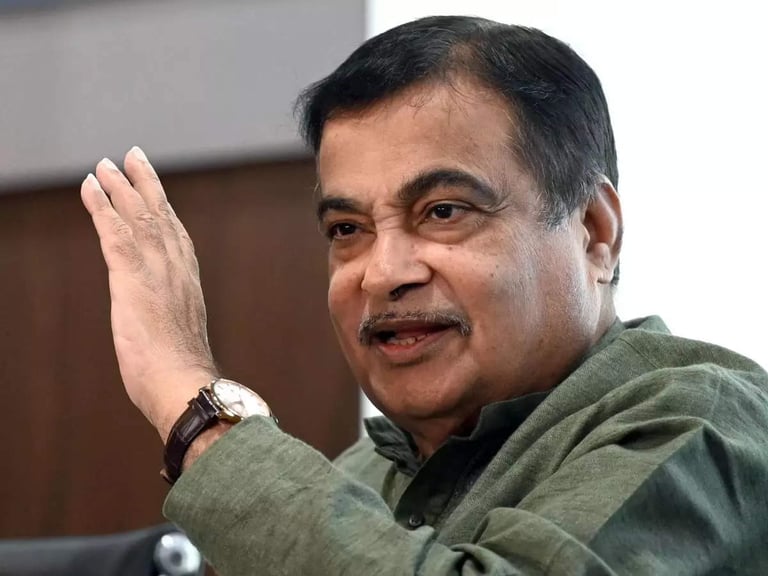

Nitin Gadkari: The Pragmatic Administrator
Nitin Gadkari (नितिन गडकरी), born on May 27, 1957, is the Minister of Road Transport and Highways. Known for his administrative efficiency and focus on infrastructure, Gadkari’s career includes several notable roles:
Minister of Public Works Department, Maharashtra (1995–1999): Gadkari’s tenure in Maharashtra was marked by significant improvements in road infrastructure, laying the groundwork for his future roles.
President of the BJP (2009–2013): Gadkari’s term as party president saw efforts to revitalize the party’s image and strengthen its organizational base.
Minister of Road Transport and Highways (2014–Present): Gadkari has overseen numerous infrastructure projects, including the development of highways and expressways. His tenure is noted for the implementation of innovative techniques and a focus on improving connectivity across India.
Public Perception
Gadkari is respected for his focus on development and his pragmatic approach to governance. His moderate stance and emphasis on infrastructure development make him a potential candidate who could appeal to a broad range of voters.
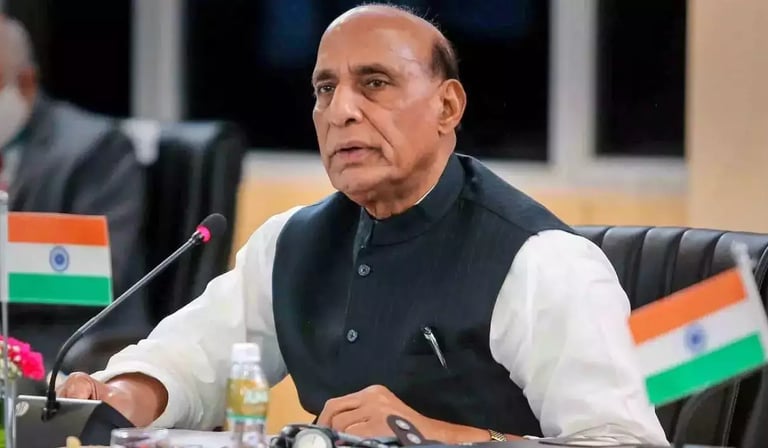

Rajnath Singh: The Veteran Statesman
Rajnath Singh (राजनाथ सिंह), born on July 10, 1950, is a senior leader in the BJP with extensive experience in both party politics and governance. His notable roles include:
Minister of Home Affairs (2000–2001): Singh’s earlier tenure as Home Minister involved overseeing crucial internal security issues.
Chief Minister of Uttar Pradesh (2000–2002): His leadership in Uttar Pradesh focused on governance and development, setting the stage for his future roles.
Minister of Defense (2014-Present): Singh’s current role has involved managing national defense and security, including handling strategic decisions and defense policies.
Public Perception
Rajnath Singh is seen as a seasoned leader with a moderate and stable image. His extensive experience in various roles within the BJP and the government positions him as a potential successor who could ensure continuity and stability.


The BJP’s Strategic Considerations for Successor Selection
Party unity
The BJP's selection of a successor will be crucial to maintaining party unity. The leader chosen must command respect across various factions within the party and align with the BJP's broader ideology. Balancing internal dynamics will be key to ensuring a smooth transition.
Electoral strategy
The successor's ability to maintain the BJP's electoral momentum will be a key factor. The leader chosen will need to attract key voter bases, especially in states where the BJP has established strongholds.
Ideological continuity
The party's ideological direction will also influence the selection of a successor. Whether the BJP chooses a leader who continues Modi's focus on economic growth or emphasizes Hindutva will depend on the current political environment and voter sentiment.
The question of “who after Modi?” is multifaceted, with several potential successors emerging as strong candidates. Amit Shah, Yogi Adityanath, Nitin Gadkari, and Rajnath Singh all bring their own unique strengths and experiences. Their backgrounds, accomplishments, and public perceptions offer a glimpse into the BJP’s future leadership.
The decision on Modi’s successor will be influenced by a number of factors, including party unity, electoral strategy, and ideological continuity. As the BJP undergoes this critical transition, the choice of leader will shape the party’s future and its approach to addressing India’s challenges and opportunities.
This comprehensive examination of potential successors provides insights into potential candidates and strategic considerations that will guide the BJP in selecting its next leader. The successor’s ability to carry forward Modi’s legacy while addressing new challenges will be crucial to the party’s continued success and stability in Indian politics.
Subscribe to our newsletter
All © Copyright reserved by Accessible-Learning
| Terms & Conditions
Knowledge is power. Learn with Us. 📚


